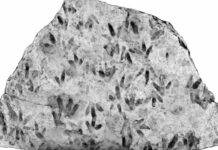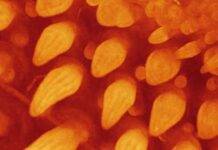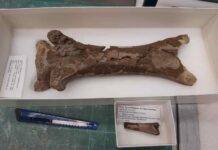
An international team of scientists has discovered a new lineage of extinct plankton-feeding sharks, Pseudomegachasma, that lived in warm oceans during the age of the dinosaurs nearly 100 million years ago. The fossil sharks had tiny teeth very similar to a modern-day, plankton-eating megamouth shark.
The study, “A new clade of putative plankton-feeding sharks from the Upper Cretaceous of Russia and the United States,” is published in the September issue of the Journal of Vertebrate Paleontology.
Lead author, Kenshu Shimada, professor of paleobiology at DePaul University, said the findings are based on newly collected tiny fossil teeth, as well as a reinterpretation of previously reported specimens from Cretaceous rocks in the U.S. and Russia.
“The study is significant because Pseudomegachasma would represent the oldest known plankton-feeding shark in the fossil record,” said Shimada. He added that these sharks would have evolved independent of the four known lineages of modern-day planktivorous cartilaginous fishes: the megamouth sharks, basking sharks, whale sharks, and manta rays.
Pseudomegachasma means “false megamouth shark” due to its dental features superficially nearly identical to the modern-day plankton-eating megamouth shark or Megachasma that evolved much later in time. The new genus is represented by two extinct species, Pseudomegachasma casei from Russia and Pseudomegachasma comanchensis from the U.S. that evolved from a group of extinct sandtiger sharks that likely had a fish-eating diet.
Reference:
Kenshu Shimada, Evgeny V. Popov, Mikael Siversson, Bruce J. Welton, Douglas J. Long. A new clade of putative plankton-feeding sharks from the Upper Cretaceous of Russia and the United States. Journal of Vertebrate Paleontology, 2015; 35 (5): e981335 DOI: 10.1080/02724634.2015.981335
Note: The above post is reprinted from materials provided by DePaul University.










